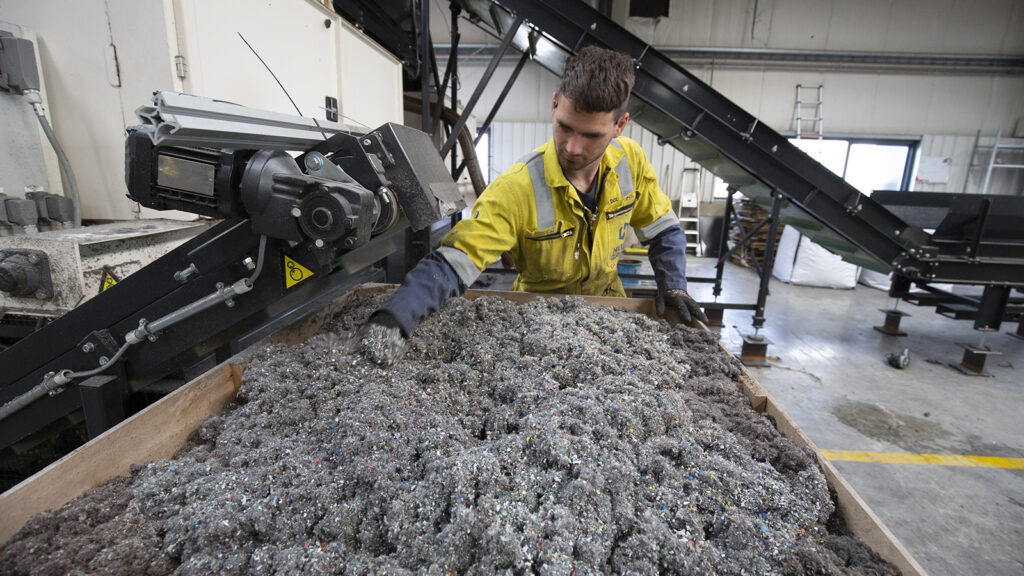
A worker is surrounded by sparks from molten steel flowing into casts in Rancho Cucamonga, California. In the past half-decade, the language around trade and globalization and the ways in which people synthesize and talk about these issues has evolved.
Photo: David McNew/Getty Images
In the past half-decade, the term “globalization” has gained an unforeseen political valence. Conferences are regularly arranged to convene experts to debate the subject. Corporate leaders have expressed their desire to respond to and resolve the issue. World leaders have been elected on the strength of their promises to find solutions to the unforeseen consequences of globalization and trade liberalization.
In that time, the language around trade and globalization and the ways in which people synthesize and talk about these issues has evolved. BRINK News spoke with Nicolas Lamp, former dispute settlement lawyer at the Appellate Body Secretariat of the World Trade Organization, about his recent paper, titled How Should We Think about the Winners and Losers from Globalization? Three Narratives and Their Implications for the Redesign of International Economic Agreements, and how these competing narratives stand to reshape the future of trade.
BRINK News: In your paper you write about three narratives around globalization and their key elements. Could you tell me what those are?
Nicolas Lamp: The first one is the establishment narrative, which has been dominant in the trade and investment space for the past decades. The guiding idea of the establishment narrative is that what we want to do is to improve wealth and economic growth. And how do we do that? By improving productivity. And we improve productivity by having an efficient allocation of resources in line with comparative advantages. You allow that by liberalizing trade, because then, everybody can do what they are best at, and they’re going to be more productive.
A key element of this narrative is that all economic gains are essentially fungible. If you lose your job and you have to take another job where you get a lower wage, that may be made up by the fact that you have access to cheaper products. The second normative element is that it’s legitimate for people to have to adjust. People have no right to their jobs. They may have to be flexible and move around, and that’s perfectly legitimate.
The most prominent counter narrative to that, in the past two years at least, has been the “Trump” narrative. This narrative conceptualizes this process of resource allocation completely differently from the establishment narrative because it says “it’s not legitimate to have this reallocation of resources.” It views workers in developing countries and trade-surplus countries as stealing jobs from the U.S. Hand in hand with that goes a rejection of the establishment narrative’s idea that it’s legitimate for people to adjust. This narrative says, “no, it’s not legitimate.”
There’s yet a third narrative, which I call the critical narrative. It essentially agrees with the establishment narrative on the benefits of liberal trade, but it’s concerned about the effect that liberalizing trade has on the power relations between the owners of capital on the one hand and workers on the other hand. It notices that if labor rights are not enforced in some countries, environment standards are not enforced in some countries, it can lead to a race to the bottom.
BRINK News: You write that these three narratives have “profound implications for the redesign of international economic agreements.” What are the implications?
Mr. Lamp: It’s simplest in the case of the establishment narrative because the establishment narrative says, “everything is fine with these agreements, the problem is with domestic policy. Domestic policymakers have to do a better job of redistributing the gains from trade.”
The Trump narrative is the opposite. It sees the types of agreements that we have as the problem because they allow cheating and the theft of jobs. What the Trump narrative will try to do is negotiate in a way that will allow increased access for U.S. products to foreign markets while minimizing access to the U.S. market. It flies in the face of the establishment narrative, which says “we have to allow international supply chains so everybody can do what they’re best at.” The Trump narrative says “we don’t care. We want to make sure that supply chains come back to the U.S. and we don’t care whether we are less efficient.”
How does that manifest itself? You can see a couple of examples. In the new NAFTA, the USMCA, you have the increase of the regional and content requirement and essentially a domestic content requirement for U.S. producers. Initially, the U.S. proposed a 50 percent domestic content requirement for cars. Every car that wanted to have duty-free exit to the U.S. had to have 50 percent U.S. content, and of course Mexico and Canada balked at that. What they did instead was impose this rule that a certain percent of the content had to be produced by workers making $16 an hour, which lets Canadians back into the fold, but cuts out Mexico. It’s all targeted at moving jobs back to the U.S.
A corporation, if they want to stem backlash, could consider engaging in less-aggressive tax strategizing. They could do more about workers’ rights.
The critical narrative’s implications are not that clear, but there are a couple of things that stand out. One thing they focus on is the ability of corporations to play workers off against each other. A way to address that is to use international economic agreements to strengthen labor in developing countries. One example is the recently initiated consultation by the European Union with Korea: The EU is trying to encourage Korea to allow effective unionization to address some of those concerns. The critical narrative tries to strengthen labor in developing countries so that labor collectively has a stronger hand against corporations, which can move capital around.
BRINK News: You’re on the faculty of law and a former dispute settlement lawyer at the World Trade Organization. Do you have a sense of how much standing these narratives have in the legal trade establishment?
Mr. Lamp: It’s hard to say. What’s striking about lawyers who are working on these agreements is that they are very tied to precedent. They’re very keen to only make incremental steps. Radical changes to trade agreements are just very far away from the precedents that the negotiators work with.
If there is a sense that the entire system could come crashing down, then things suddenly might start moving really fast. For example, investor-state arbitration has been eliminated between Canada and the U.S. in the new NAFTA. If the U.S. continues pursuing further agreements in which you don’t have investor-state dispute settlements (ISDS), then the people who still want to keep ISDSs may be way more open to considering more radical changes to the system in order to keep it alive. There are these competing pressures, on the one hand incrementalism, on the other hand, the fear that you might lose everything if you don’t move.
BRINK News: What are the risks to corporations that are aligned with the establishment narrative? Is there any room for them to move in the direction of the Trump narrative or the critical narrative?
Mr. Lamp: It depends, of course, on the particular business where their market is. If they can get all their supply from the U.S. market, then it would make sense to adapt to the Trump narrative by relocating production to the U.S. But it may be more promising to think in the vein of the critical narrative. A corporation, if they want to stem backlash, could consider engaging in less-aggressive tax strategizing. They could do more about workers’ rights. You see some movement in this direction, with Amazon accepting the $15 minimum wage.
I think some of the purchase that the Trump narrative gets stems from the idea that people feel like their jobs are intimately connected to their identity and to the survival of their community. Corporations should take that seriously, even if they can’t make it the governing philosophy of their operations. If companies can make it part of their strategy to say “Okay, we make sure that workers in our factories are paid well, and our contractors pay adequate wages and comply with or potentially allow unionization,” that could also create goodwill, making business more sustainable. Of course, that’s more possible in industries where there are fatter margins than in others where the margins are extremely thin.
I think a change in mindset would go a long way toward taking some of the pressure or some of the momentum out of the Trump narrative and this wider backlash against the global elite that’s currently taking place.
BRINK News: The losses from globalization are mostly concentrated—at least in the U.S.—in the South and South Atlantic, where a relatively small percentage of jobs have been impacted. Why do these losses resonate so much? Why did they lead to such skepticism of the establishment narrative?
Mr. Lamp: The establishment narrative is at pains to point out that 8 percent of the workforce is in manufacturing, which is a very small percentage. I think that because it’s so geographically concentrated, it’s much more noticeable. When you have entire towns essentially depending on one factory, the closing of the factory results in the decline of the entire town and the entire community.
You have more people lose jobs every month in the retail sector than you have losses of manufacturing jobs in an entire year. The numbers are in a different dimension in the service sector. But it rarely has a very concentrated impact. It’s not so geographically concentrated, and it doesn’t have the same effect of dragging entire communities down.
This interview has been edited and condensed for clarity.






